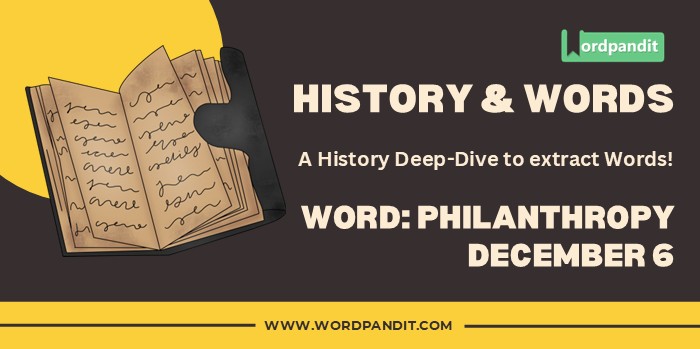History & Words: ‘Philanthropy’ (December 6)
Welcome to ‘History & Words.’ 🌟 I’m Prashant, founder of Wordpandit and the Learning Inc. Network. This series combines my passion for language learning with historical context. Each entry explores a word’s significance on a specific date, enhancing vocabulary while deepening understanding of history. Join me in this journey of words through time.
📚 Table of Contents
🔍 Word of the Day: Philanthropy
Pronunciation: /fɪˈlænθrəpi/ (fi-LAN-thruh-pee)
🌍 Introduction
On December 6, 1892, John D. Rockefeller made history with a transformative gift of $35 million to establish the University of Chicago, marking one of the largest philanthropic donations to education at that time. This moment represented a pivotal shift in how private wealth could be leveraged for public good, particularly in higher education.
The word “philanthropy” embodies the concept of private action for public benefit, going beyond mere charitable giving to encompass strategic efforts to address societal challenges. Rockefeller’s gift exemplified this approach, aiming not just to build a university but to create an institution that would advance human knowledge and understanding.
This historic donation set a precedent for wealthy individuals taking an active role in shaping educational institutions and other public services, a practice that continues to influence modern philanthropic giving.
🌱 Etymology
The word “philanthropy” derives from the Greek words “philos” (loving) and “anthropos” (mankind), literally meaning “love of humanity.” The term first appeared in ancient Greece, where it described a state of being useful to humans. Over time, it evolved to specifically refer to private initiatives for public good, particularly focusing on strategic giving to address root causes of social issues.
📖 Key Vocabulary
- 🔑 Endowment: A financial foundation for an institution, typically invested to provide ongoing income
- 🔑 Benefactor: A person who provides financial or other support to a person or cause
- 🔑 Grant-making: The process of awarding financial support to individuals or organizations
- 🔑 Social Investment: Using private capital to generate both financial returns and positive social impact
- 🔑 Legacy Giving: Charitable donations made through a will or estate plan
🏛️ Historical Context
The late 19th century, known as the Gilded Age, saw unprecedented accumulation of private wealth in America. This period coincided with the rise of institutional philanthropy, as industrial magnates sought to address social issues through systematic giving.
Before Rockefeller’s era, charitable giving typically focused on immediate relief of suffering. The emergence of strategic philanthropy represented a new approach, targeting root causes of social problems through sustained, systematic investment.
The establishment of major universities through private philanthropy became a hallmark of this period, with donors like Rockefeller, Leland Stanford, and Johns Hopkins creating institutions that would reshape American higher education.
⏳ Timeline
- 1890: Initial discussions begin for new Chicago university
- 1891: University of Chicago chartered
- 1892: December 6 – Rockefeller’s $35 million gift announced
- 1892: Construction begins on campus
- 1893: First classes held at the University
- 1910: Rockefeller Foundation established
- 1913: Rockefeller Foundation receives federal charter
🌟 The Day’s Significance
December 6, 1892, marked a watershed moment in American philanthropy. Rockefeller’s gift to establish the University of Chicago was unprecedented not only in its size but in its vision for creating a world-class research institution from scratch.
The donation demonstrated a new model of philanthropy that combined careful planning, professional management, and clear objectives. Rockefeller worked closely with education experts to ensure the university would meet the highest academic standards.
This gift also helped establish Chicago as a major cultural and educational center, transforming the city’s reputation and creating opportunities for countless students and scholars.
💬 Quote
“The best philanthropy is constantly in search of the finalities—a search for cause, an attempt to cure evils at their source.” – John D. Rockefeller
🔮 Modern Usage and Reflection
Today, philanthropy encompasses a broad range of approaches, from traditional charitable giving to impact investing and venture philanthropy. Modern philanthropists often combine multiple strategies to achieve their goals.
The field has evolved to embrace transparency, accountability, and measurable outcomes, while still maintaining the core principle of private action for public good.
🏛️ Legacy
Rockefeller’s gift to the University of Chicago helped establish a model for modern institutional philanthropy. This model influences contemporary mega-donors and foundations in their approach to strategic giving and institution-building.
The success of the University of Chicago also demonstrated the potential impact of well-planned philanthropic investments in education, inspiring similar efforts worldwide.
🔍 Comparative Analysis
While 19th-century philanthropy often focused on creating institutions, modern philanthropy increasingly emphasizes systemic change and global challenges. However, the fundamental principle of using private resources to address public needs remains constant.
💡 Did You Know?
🎓 Conclusion
The establishment of the University of Chicago through Rockefeller’s philanthropy represents a pivotal moment in the evolution of strategic giving. This event continues to influence how we think about the role of private wealth in addressing public needs and the potential for individual philanthropy to create lasting social change.
📚 Further Reading
- 📘 “Titan: The Life of John D. Rockefeller, Sr.” by Ron Chernow
- 📗 “The Creation of the University of Chicago and the First Board of Trustees” by Thomas Wakefield Goodspeed
- 📙 “American Philanthropy” by Robert H. Bremner











